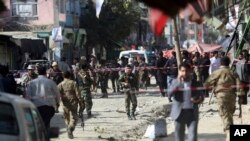Following numerous Islamic State attacks on Afghanistan's Shi'ite minority in several provinces, the government in Kabul has enlisted hundreds of Shi'ite civilians to protect their religious sites against the growing IS threat.
“Based on the demands of Shi'ite elders and scholars, and a decision by the National Security Council, local people have been recruited to help protect mosques in Kabul,” Mohammad Sadeq Muradi, Kabul deputy police chief told VOA.
Monthly salary for members of force
The 505-member militia force has received weapons and a monthly salary of around $100 per person from the Ministry of Interior to beef up security around 100 mosques, including Sunni sites, in Kabul, according Abdul Ahmad Yazdan, a member of the Kabul Provincial Council.
The recruits have been enlisted in coordination with local Shi'ite leaders and would operate under the Ministry of Interior.
Since its emergence in 2015, the Islamic State terror group has claimed responsibility for a number of deadly attacks across Afghanistan and has been accused of indiscriminately attacking civilians in general and the Shi'ite minority in particular.
Last Friday, IS claimed responsibility for storming a Shi'ite mosque in Kabul that killed five worshipers and wounded 30 others. The worshipers had gathered for a religious ceremony to commemorate the death of Hussain Ibn Ali and his family members, one of the grandsons of Prophet Mohammad who had refused, around 1,400 years ago, to pledge allegiance to a political rival whom he viewed as unfit to rule.
More deadly attacks
In August, IS militants claimed credit for a deadly attack in the country's northern Sar-e-Pul province, killing over 50 Shi'ite Muslims, including children and elderly.
In early August, the terror group attacked a Shi'ite mosque in western Herat province, killing and injuring dozens of worshippers. Among the dead was the father of Fatima Qaderyan, captain of the Afghan all-girls robotics team that made headlines last month after managing to get U.S. visas to participate in the International Robot Olympics for High School Students in Washington D.C.
The girls were initially denied U.S visas, but following President Donald Trump's personal intervention, they were able to travel to the United States.
The Afghan government says the attacks on Shi'ite mosques and seminaries are aimed creating a sectarian divide in the country.
“The Afghan people believe in religious moderation and do not accept any extreme interpretation that may cause divisions and enmity,” Afghan President Ashraf Ghani told a Shi'ite gathering Sunday in Kabul.




